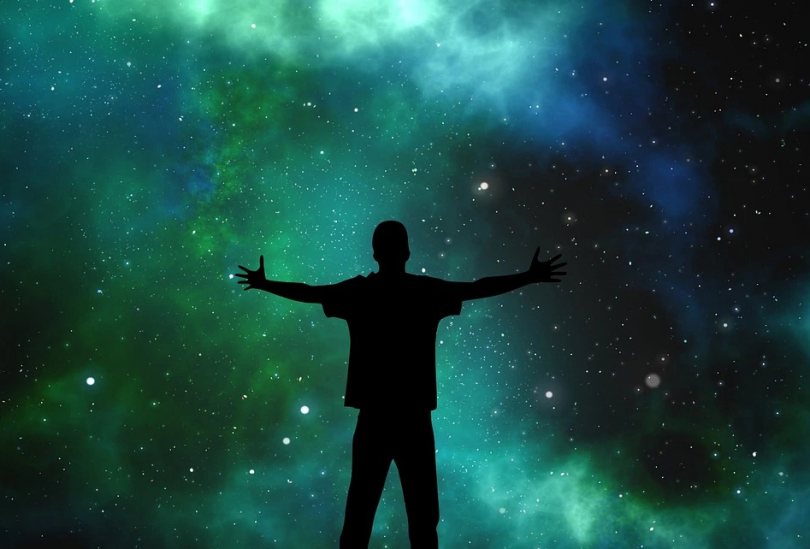aNewDomain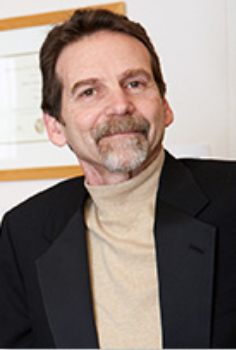 — Recent political developments here and around the world have a lot of folks thinking hard about things like ethics and faith.
— Recent political developments here and around the world have a lot of folks thinking hard about things like ethics and faith.
As far as both ethics and faith go, we’re in a bind — a classic rock and a hard place bind.
The rock is extremist-fundamentalist religion. The hard place is postmodern free-market anarchy.
Fortunately, there is an alternative to these debilitating excesses which have the world in a vise grip. I call it enchanted agnosticism.
Now, agnosticism has a long and many-layered history. In recent times, it’s associated with scientific doubt — that is, the unverifiable.
That’s not what I’m talking about it at all.
I’m referring to that other kind of agnosticism — the one that takes doubt, and particularly the mystery of being, a step further. That’s what I mean when I say enchanted agnosticism.
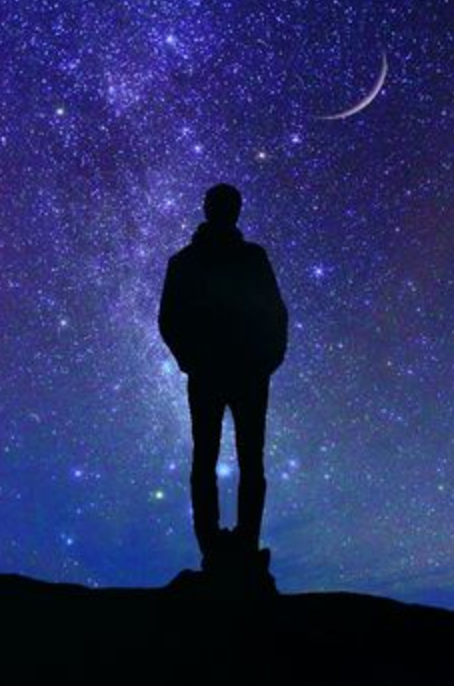 Deciphering the indecipherable
Deciphering the indecipherable
By enchanted agnosticism, I mean bedazzled uncertainty, exhilarated discernment and enraptured curiosity.
I mean the openness and skepticism of science wedded to the zeal and exaltation of religion. And I mean the veneration of mystery wedded to the solemnity of responsibility.
To put all this in philosophic terms, what I’m talking about here is an existential faith — a faith in the inscrutable.
Enchanted agnostics believe that behind every institutionalized religion is a single transcendent question, the question of ‘what is beyond that?’
Our answer is that behind every bounded faith resides an evolving, indefinite faith. Beyond every bounded god resides an expanding, indecipherable god.
Captivating as they may be, gods and goddesses, idols and icons, obsessions and fixations are, after all, but pale stand-ins for the inscrutable.
READ: Spirituality of Awe: On Wonder and the Coming AI Age
Even concepts like the Absolute or Atman or the Void — to the degree they are decipherable — are but veneers of this mysterious power.
As Paul Tillich put it in The Courage to Be, veneers of the holy must not be identified with the holy itself, the ‘God beyond God.’
A radical view
This radically new view of being — or creation, or God, whatever the term you ascribe to it — is a view that trumps nihilism.
It also trumps dogma, purposelessness and all degrees of certitude. It is a view, you see that basks in amazement, astonishment and bewilderment with the things around us, but not the particular things themselves.
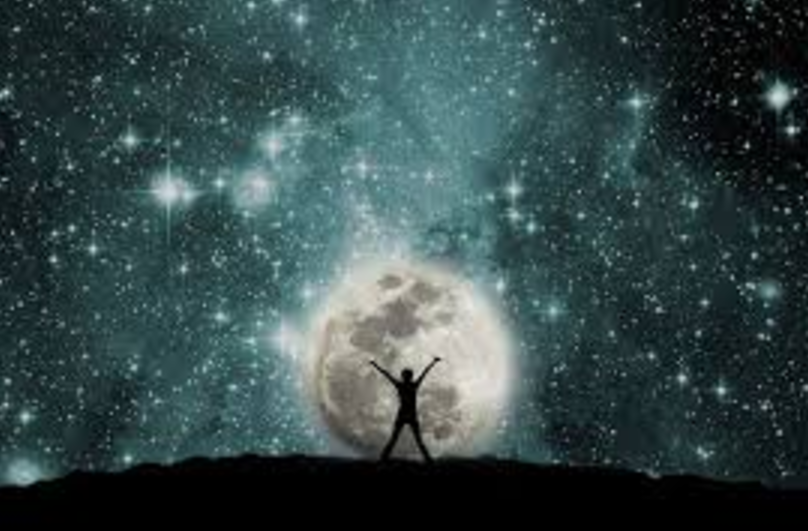 That’s a shift.
That’s a shift.
The definable gods of the Old and New Testaments, ancient myth and popular culture tend to polarize us, either by containing and belittling us or by inflating and exaggerating us.
But a faith in the inscrutable, in being, fosters wholeness. Not puritan wholeness or absolute wholeness, but a dynamic, paradoxical wholeness.
The inscrutable at once evokes our humility and our possibility.
But, instead of dictating these conditions from on high, it inspires us to negotiate them, to find our way within them.
The result of this understanding is that devotees of the inscrutable are more inclined to see through their investments and be less driven by them.
They are less entrapped–either by false hope or false despair — and they are enlivened by a poignancy to life, an overview, that heightens each attendant moment.
Enchanted agnostics are the leaders-to-be of a new spiritual consciousness.
 Faith in the inscrutable blends three intertwining perspectives: the magnificence of creation, the mystery of creation, and our responsibility to creation.
Faith in the inscrutable blends three intertwining perspectives: the magnificence of creation, the mystery of creation, and our responsibility to creation.
Magnificence
We don’t need a directive or a definable god to feel the presence of divinity. The magnificence of creatin demands it. That creation exists at all is magnificent, amazing, incomprehensible.
So too, all that partakes in creation must be seen as equally amazing, equally magnificent–death as well as life.
This magnificence measures the span of humanity’s hope, and demands the tolerance that comes from being open to awe.
Magnificence is, at its core, simply the appreciation for all being. It’s the first landmark for us enchanted agnostics.
Walt Whitman reminds us:
Grand is the seen, the light, to me–grand are the stars,
Grand is the earth, and grand are lasting time and space,
And grand are their laws, so multiform, puzzling, evolutionary,
But grander far the unseen soul of me, comprehending, endowing all those … (Leaves of Grass, n.d.)
Mystery
The flip side of magnificence is mystery, which is the second landmark. One of the greatest dangers of our age is jadedness. The more jaded we become, the less we acknowledge Mystery; the less we acknowledge Mystery, the more we lose touch with its current and with the inscrutable itself.
Magnificence and Mystery are a pair.
We cannot have magnificence without uncertainty. And we cannot have mystery without hope.
This paradox is often overlooked in mystical circles, which sometimes emphasize magnificence to the detriment of mystery.
Paul Tillich was no stranger to it, though. As he pointed out in The Dynamics of Faith, mysticism neglects “the separation of man from the ultimate. There is no faith without separation.”
With separation comes anxiety, of course, and faith must somehow find a way to live with this sense of unease.
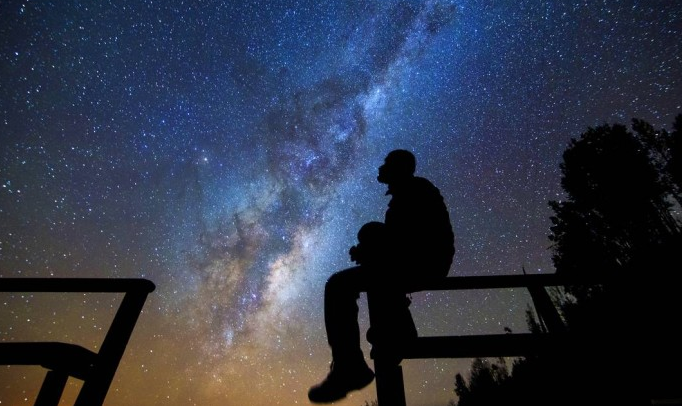 To put it in another way, uncertainty reminds us of our fragility, but it also reminds us of our possibility
To put it in another way, uncertainty reminds us of our fragility, but it also reminds us of our possibility
Again, here’s Tillich:
“[F]or man is finite, and he can never unite all elements of truth in complete balance. On the other band, he cannot rest on the awareness of his finitude, because faith is concerned with the ultimate and its adequate expression. Man’s faith is inadequate if his whole existence is determined by something that is less than ultimate. Therefore, he must always try to break through the limits of his finitude and reach what never can be reached, the ultimate itself.”
Mystery, then, is an openness to what evolves in our lives and the lives of those we touch.
That in turn leads to the third landmark, which is the challenge and responsibility to respond to what evolves.
The responsibility to respond
Creation’s magnificence leads us to such foundational religious concepts as respecting the stranger, venerating God and so on. Mystery, however, leads us to responsibility. It brings to us the challenge to respond.
Reflexive, even passive, approaches to worship can answer the call to magnificence. But mystery calls for something different, for something akin to what the existential philosopher Ernest Becker once called reflective, dialectical worship.
for something different, for something akin to what the existential philosopher Ernest Becker once called reflective, dialectical worship.
This is key. Only when we can face and accept the mystery of the inscrutable can we understand the bracing fundamental truth that each of us, as individuals, must act. We must make decisions actively — and we must bear all the brunt of that decision-making.
We enchanted agnostics cannot passively defer to authority because there is no certain authority to accept our surrender.
There is no marked path, no ‘highway to heaven.’ And there’s no inviolable canon to follow to the letter or interpret to our liking.
In enchanted agnosticism, there is no one to sanctify the scripts for us or to help us find the right path. We have to do that for ourselves. That is not to say we are rudderless, though. Faith in the inscrutable does provide landmarks.
Magnificence, mystery and responsibility are three of them.
And those three add up to another, greater one: an ability and a desire to whole-body deep dive into our dilemmas and concerns.
Tillich, famously, calls that “listening love,” which is the same concept behind depth therapy as well as Martin Buber’s I-Thou philosophy dialogue.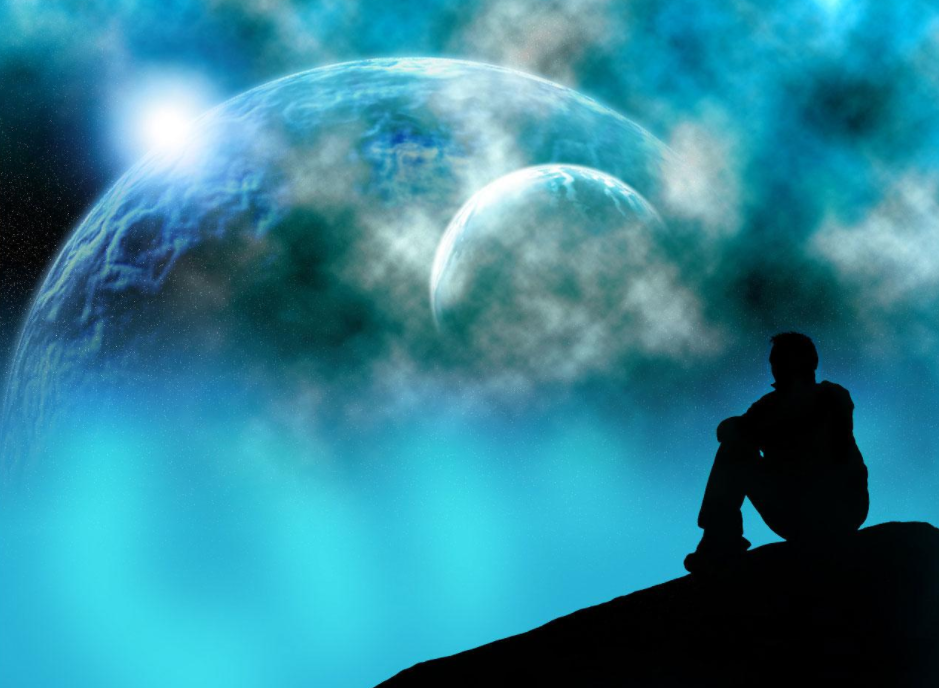
“Listening love,” he writes in My Search for Absolutes, is a “a listening to and looking at the concrete situation in all its concreteness, which includes the deepest motives of the other person.” Adds Tillich:
“The more seriously one has considered all the factors in a moral decision, the more one can be certain that there is a power of acceptance in the depth of life.”
The responsibility to respond compels a mutable respect, a respect that leans on humanity Just as one can’t apply a “fits all” product to a diverse and opinionated populace, one can’t force a “fits all” ethic to a complex and changing existence.
Instead, the principle of responsibility that is at the heart of enchanted agnosticism calls upon the deepest energies of democracy the fullest engagements of dialogue, and the keenest perceptions of context.
Nor is the principle of responsibility a kind of “situational” ethics, as that approach is conventionally understood. Enchanted agnosticism advocates an “awe-based” situational ethics, an ethics infused by the thrill and anxiety of living and the reverence, humility and wonder of living.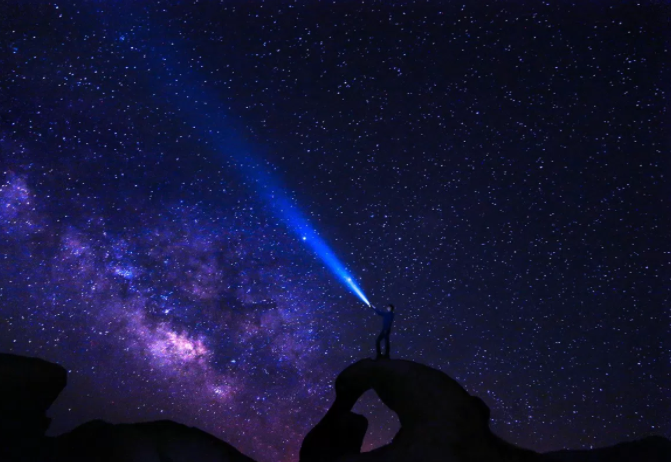
While other situational ethics tend to resort to intellectual or consensus-based criteria, an awe-based ethics is ever attuned to the whole, the embodied, and the relational in its deliberations (as in listening love, or person-to-person encounter).
The Way to the Inscrutable
Enchanted agnosticism is thus very different from the reflexive faith of disciples, or the expedient faith of marketers, or the obsessive faith of fanatics — or even G.W. Bush’s faith-based education.
Faith in the inscrutable is wrought from our encounter with these and other, singular faiths. It is a faith wrought from the encounter with the myopic, the fleeting, and the one-dimensional–a faith wrought from pain but not confined by pain.
It is a faith born of deep self-inquiry  deep presence to the results of that inquiry and deep trust in the unfolding of the results. It is a faith born of confidence that one can survive one s own intense grappling, hut it is not just a faith in survival; it is a faith in that which permits survival to occur.
deep presence to the results of that inquiry and deep trust in the unfolding of the results. It is a faith born of confidence that one can survive one s own intense grappling, hut it is not just a faith in survival; it is a faith in that which permits survival to occur.
Awe-based faith entails a “giving up when there’s nothing left,” as Ernest Becker put it in 1974, a placing of ones trust in the “tremendous creative energies of the universe” to work through and with us when we are spent.
The key here is that such faith often requires that we struggle until we are spent. Struggle jolts the system, dents the armor, and jars the rails. But struggle is only the beginning. The shock and the awakening we experience are only preparatory.
The next crucial question is how we pursue, engage with, and emerge from this struggle. We must learn to acknowledge, identify with, and yet somehow be more than that with which we contend.
Expediency, the catch-word of our time, is not a route to the inscrutable. It is a route to the definable, the consolable, and the delimiting. You can’t partake of the fruits of vibrancy, of the profound and the emancipating, through just gimmickry.
There are no tricks to cultivating awe.
The dangers of delusion
The danger today is that we delude ourselves into believing in such tricks; that we mistake Isaiah Berlin’s jigsaw puzzle universe for the brute and throbbing one into which we are thrust.
Almost every cutting-edge technology poses this danger-virtually every designer drug, genetic manipulation and robotic innovation holds the potential for abominable self-delusion.
While we can be aided and, indeed, miraculously transformed by these developments, we must not lose touch with their partiality and their envelopment by the inscrutable.
Vision
What will the enchanted world look like?
I envision it as a time when enchanted agnosticism is echoed in schools and in temples, in boardrooms and in embassies, in bedrooms and in alleyways –in every human sphere.
It’ll be a time when hurches throw open their doors to mosques, and mosques to synagogues; when Buddhist priests can perform sacred chanting rites before Hindu congregants; and when Jewish temples sanction Protestant services.
And it’ll be a time, perhaps, when every major denomination would regularly host every other major denomination and yet maintain their respective identities; when families of all faiths and backgrounds will pray together, break bread together and partake in each others’ heritage.
When awe-based living is at the rightful center of business and diplomacy, everything will be different.
 Politicians and mediators and entrepreneurs will model the actions they expect of others in such an enchanted agnostic world. They’ll partake in interfaith ceremonies, avail themselves to intimate interchange, and open to diverse folk traditions.
Politicians and mediators and entrepreneurs will model the actions they expect of others in such an enchanted agnostic world. They’ll partake in interfaith ceremonies, avail themselves to intimate interchange, and open to diverse folk traditions.
When diplomatic and trade meetings are attended not only by policymakers, but also by ethical philosophers, spiritual leader, and organizational psychologists.
Only awe-based living can stanch the spirals of hate, tit-for-tat and intercultural estrangement . And only then can conciliation have a chance.
At last, people everywhere will be able to share freely. Only then will input from scientists and philosophers match that from legislators and generals.
It will be a time when representatives can broach each others’ personal fears as well as state or corporate agendas; when international relations can be spoken about in terms of interpersonal relations; and when hopes and trepidations couple with predictions and averages.
Suddenly people everywhere will approach each other and our world from a stance of curiosity, wonderment and potentially even attraction, for commensurate with the rise in enchanted agnosticism will be the corresponding rise in intra and intercultural reassessment, trust and cooperation, and with these developments, entire worlds will unfurl.
Religious and scientific types, for example, will begin to perceive not only their respective divergences, but also their respective convergences, utility, and virtues.
Adherents of doctrinal faith will reassess the value of openness and skepticism, devotees of calculation will reevaluate the legitimacy of veneration and faith. Spiritualists will rethink material realities. Materialists will revisit the ethereal, poetic and felt.
Although hesitant at first, each of the respective parties will become increasingly appreciative of the others’ legitimacy, lucidity and sublimity.
Sound remote? Out of reach?
 It isn’t. Not really.
It isn’t. Not really.
Detonating the Great Detonation
Social theorists from Carl Rogers to Michael Lerner have been promoting such interchanges for years and many have partaken of their fruit.
As more partake in The Great Conversation, fewer will pine for The Great Detonation, or The Holy Vindication.
And, as some invite deepening and widening, others will permit risking, opening.
In short, enchanted agnosticism–the embrace of mystery–has tremendous potential to address the confusion and spiritual hunger of our lives.
In her illuminating study of religion, The History of God, Karen Armstrong concludes that we in the West have reached a developmental milestone. We have witnessed the disasters of fundamentalist tyrannies and, equally, of post-Enlightenment oligarchies, and we are in need of something different.
This alternative, Armstrong suggests, just might be what she calls “mystical agnosticism.” That’s a close analog to my enchanted agnoticism.
The problem, she cautions, is that in order for such an alternative to be viable it must be “felt upon the pulse,” or as Buber put it, “hallowed in the everyday.”
That’s my challenge to you, too.
For aNewDomain, I’m Kirk Schneider.
Kirk Schneider’s latest book, Spirituality of Awe: Challenges to the Robotic Revolution, is available now.
Cover image: Danvizi, All Rights Reserved. Inset images: Huffington Post, All Rights Reserved; FaysalPoetry, All Rights Reserved; Gycweb.org, All Rights Reserved; Komentare, All Rights Reserved; Ogimg, All Rights Reserved; FR.pinterest; All Rights Reserved. Commedesfous, All Rights Reserved; DLParsbook, All Rights Reserved.
An earlier version of this essay ran on Tikkun. Read it here. -Ed.

